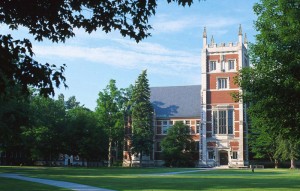 BRUNSWICK, Maine — A Christian group at a liberal arts college in Maine has lost its recognition for refusing to follow the school’s ‘anti-discrimination’ policy by requiring group leaders to be born again Christians.
BRUNSWICK, Maine — A Christian group at a liberal arts college in Maine has lost its recognition for refusing to follow the school’s ‘anti-discrimination’ policy by requiring group leaders to be born again Christians.
Bowdoin Christian Fellowship has been recognized on the campus of Bowdoin College for the past forty years. But after this summer, it will be losing its privileges at the school simply because the groups wants its leaders to be Christian.
“I want them on campus, because it’s a sanctuary for many of our conservative evangelical students—Bowdoin has accepted these students, and they need a place, and they need to have their faith challenged,” Robert Ives, a United Church of Christ minister who also serves as the director of religious and spiritual life at the college told the New York Times.”But every organization has to be open to every student, and every position of leadership has to be open to any individual, without discrimination.”
Ives was referring to Bowdoin College’s anti-discrimination policy, which requires that all students, regardless of their religious affiliation, be permitted to run for leadership positions.
“It would compromise our ability to be who we are as Christians if we can’t hold our leaders to some sort of doctrinal standard,” former member and now graduate Zackary Suhr, 23, told reporters.
The college has already revoked the keys that the group possesses, which granted them access to college facilities. Bowdoin Christian Fellowship will now only meet informally as a group.
As previously reported, a similar situation took place in February 2013 when University of Michigan officials revoked the recognition of InterVarsity Christian Fellowship for refusing to change its constitution to allow non-Christian leaders.
“For us, there’s no other option than to hold to the tenets of our faith,” stated member Sara Chang. “We want to model a lifestyle of integrity. Holding the Bible as the inspired, divine word of God and seeing the commands for us to choose leaders who have a vibrant faith in Jesus is obviously something very important that we want to continue to uphold.”
“The university is sending the message that religious voices are suspect and should be marginalized,” Greg Jao, national field director for InterVarsity, also told reporters. “I think it sends the message that the university does not understand the nature of religious beliefs and the convictions of religious students.”
“The sad place that we’ve arrived at is that certain campuses in pursuit of tolerance and diversity are now saying they will use those standards to discriminate [against] and marginalize viewpoints they disagree with,” he continued. “I can’t imagine the Muslim Student Association saying you don’t have to be a Muslim to help lead our group. … I think the university’s decision will impact any religious group that’s being honest about their leadership criteria.”
Similar policies are increasingly being implemented at colleges and universities across America.
Become a Christian News Network Supporter...


